The Invisible Illness: Ellen Noble's Yearlong Health Struggle
The Invisible Illness: Ellen Noble's Yearlong Health Struggle
In 2018, cyclocross star Ellen Noble saw her results start to slip. Here, she opens up about battling an invisible illness, and trying to save her career.
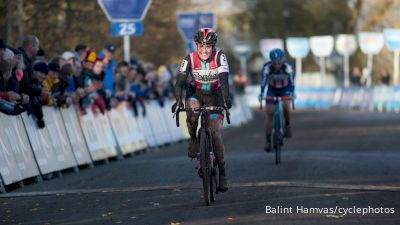
Unlock this article, live events, and more with a subscription!
Already a subscriber? Log In
The course was ice-covered, the air was ice-cold. Bieles, a small industrial town in Luxembourg, was hosting the UCI Cyclocross World Championships in some of the worst conditions racers had seen all year. And American Ellen Noble was on her way to doing what only a handful of Americans had done before: She was on her way to winning a silver medal in the Under-23 race.
It was January 28, 2017.
That night, she’d celebrate in style in Brussels. Then, after taking meetings with some of the most prestigious cyclocross programs in the world, she would finally fly home. She'd been on the road for weeks.
Over the next two years, she’d become one of the winningest (and most popular) racers in the US. She stood on the podium at the national championships and the Waterloo World Cup—and accrued tens of thousands of followers on Instagram and Twitter, where she often chronicles her crazy life and engages with fans.
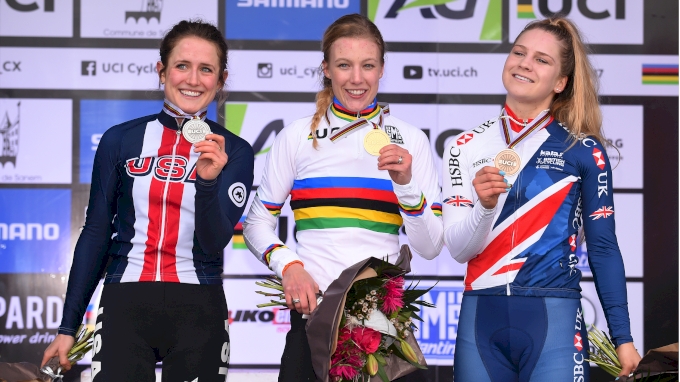
Noble stands on the U23 podium alongside Annemarie Worst and Evie Richards (Getty Images)
Then, late last year, a switch flipped. The now-24-year-old Noble saw her results start to slip. It started with a tight battle at the Pan-American Championships against Maghalie Rochette.
Noble took second after a late race crash, but honestly, the fatigue had already begun creeping in and she wasn’t feeling her best. She struggled through the rest of the seasons—a third place at Nationals, some mid-pack European results—but something wasn’t right.
She pushed through spring training and found herself at the back of the early season World Cup mountain bike races. Finally, she admitted she needed to take a step back and figure out what was actually going on.
Now, well into the 2019-20 cyclocross season, the Trek Factory racer is still not performing at the level she was a year ago, but she’s back on the start line and working her way up.
Here, Noble talks about her frustrations, her FOMO, and how invisible illness can sometimes be harder to deal with than a more obvious injury.
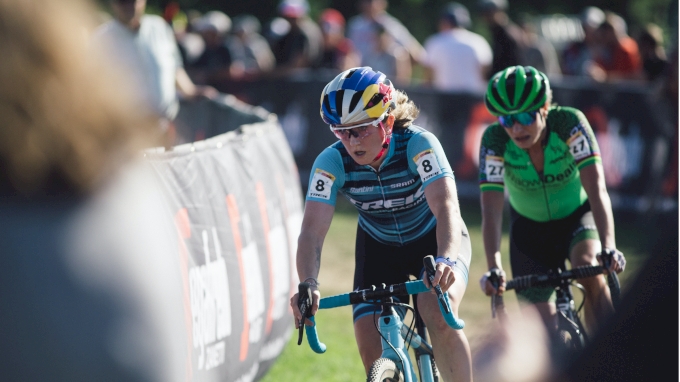
Noble battled Marianne Vos at the 2018 Waterloo World Cup (Balint Hamvas)
Okay, we’re just going to dive in with the big question. You’ve alluded to health issues: What’s up?
I’ve been having chronic fatigue-like symptoms for the past year. After some bloodwork and testing, we found that the fatigue and decreased performance were coming from a multitude of sources, resulting in some autoimmune responses.
It’s still not completely resolved, but I have been able to make some lifestyle changes that have really helped me get back on track and start to feel like myself, though the training and racing component have been slow to follow.
What kind of changes did you have to make?
I’ve been focusing on training only when I feel fully ready. That’s meant a lot of unfortunately skipped days and unplanned rest weeks and cutting workouts in favor of sleep.
I’m focusing on going back to the source and figuring out what’s actually restorative for me, and understanding that more isn’t always more.
You’ve told me before that in high school, you played multiple sports and you’d not tell one coach about a practice for the other sport.
You’ve always been a pretty hyper-focused athlete, juggling a ton of stuff from school to heavy training to loads of racing—do you think that played into what’s going on now?
Yes—that’s a good point. I’ve always pushed the limit of what I could handle. That may have played a role in what got me to this point, what got me in trouble.
Rolling one season to the next has been what I’ve done as long as I can remember, even though my coach Al [Donahue] has urged me to rest more. I raced a lot—A LOT—and that plays a factor. I think some people can train harder than I’ve done, but it comes down to how much you race in a season, and I was racing multiple professional race seasons in a row.
For me to step back—I’ve only done ten races this season—was really hard. We had to take a huge step back from racing and from training. I’ve taken more time off this year than I ever have.
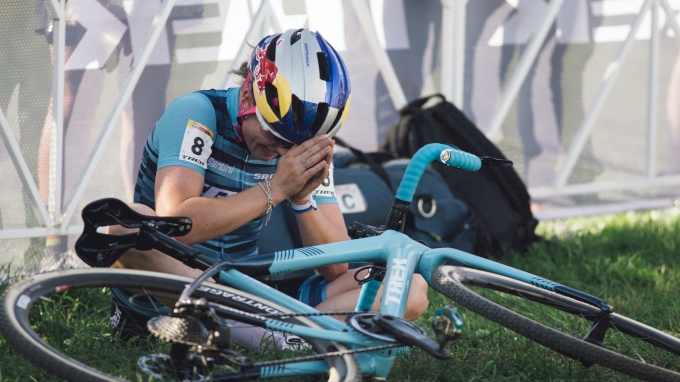
After finishing second to Vos in Waterloo (Balint Hamvas)
What has the time off looked like?
A lot of exploration: I’ve been looking at what I eat and why and how I eat it. How I’m training and why I’m doing it. Sleeping, resting, getting enough sunshine. I had to boil it down to the most simple points. And the big thing I’ve had to do this year is that I had to figure out who I was without bike racing, or I never would have made it through this process.
With racing, at this point, I don’t have much left to ride off of: It’s been nearly a year since I had any kind of result I was happy with. The few times I have raced have been hard to stomach because they were so poor. In mountain biking, the Nove Mesto and Albstadt World Cups were really tough, I finished in the sixties.
That wasn’t the racing I had envisioned for myself. I wanted this to be the year I made a legitimate run at going to the Olympics and instead I did only two World Cups. That was hard.
You had to do a lot of on-the-fly goal re-orientation.
Yes! And to wake up every morning without the success of winning bike races or results, or without even the structure of training, where my only goal was to ‘get better,’ I had to learn to look in the mirror and still like myself.
I think that’s hard for a lot of people—I think that’s why a lot of pro athletes postpone retirement for so long because ‘who are we’ without our sport?
I’m still riding, but I’ve had to cut it back so I needed to figure out what else I liked doing because I was only able to train an hour or two a day. It was a process.
I feel like I achieved that part of my goal, finding a life off of the bike.
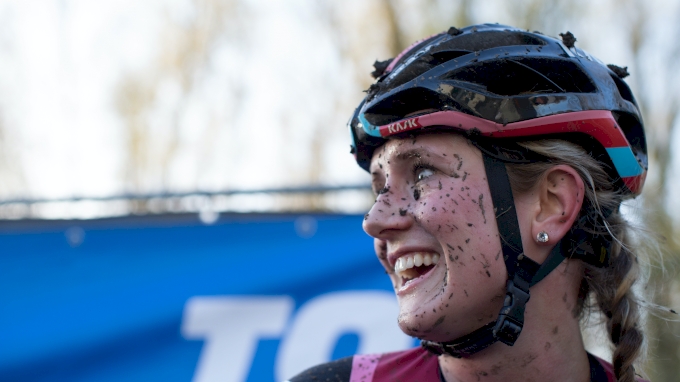
Noble had a breakout ride at Flandriencross in 2017 (Balint Hamvas)
But you had to balance that with the focus on rest.
It was endlessly frustrating! I ended up feeling bored a lot of the time, and then, feeling a lot of guilt because I’ve never lived like this. For a long time, I had school, and once I graduated, I had a focus on training and racing.
Then, suddenly, I’m so tired I couldn’t do anything productive, which made me frustrated at myself. I tried to stay busy—I played guitar a lot, I read a lot, I cooked a lot. I focused on just living with intention.
I know in the past you’ve been big on journaling—have you done any of that lately?
Yes—I don’t bullet journal at like Pinterest board level or anything, but I do a lot of list-making and journaling. I look at the journal like the Pensieve in Harry Potter, where he could send his thoughts into that pool. That’s how I feel when I get my thoughts down on paper.
That helps a lot, but the biggest thing has been actually working with a therapist because at a certain point, the journal is amazing but having someone who can listen is huge.
So, you’ve tossed around the phrase ‘comeback’ a few times: What are we calling right now?
I know that they say never to call it a comeback…but I think I’m going to call it a comeback.
What else is it going to be? I was at one place, I’m not there right now, I’m hoping to get back there and surpass it. And while it would be great, I don’t think it’s going to be one ride, I think it’s going to be a slow and steady comeback.
That’s how my whole career has gone, slow and steady.
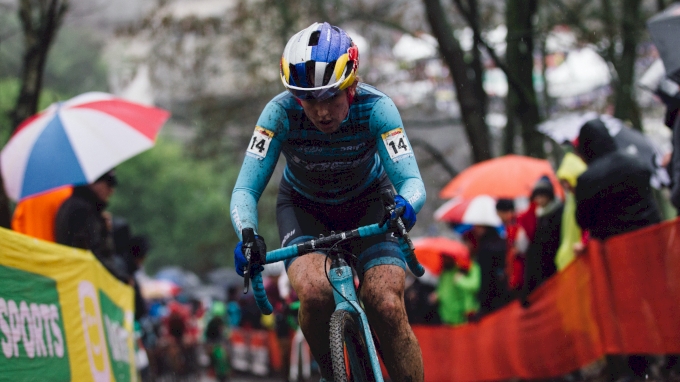
Noble's health struggle began mid-way through the 2018-19 season (Balint Hamvas)
And ultimately, you could have quit and found a ‘normal’ job.
Yes! I had this conversation with my coach and he said a lot of people would likely have given up at this point, and I should be proud of sticking with it. If I had reason to believe I was never going to get better, that would be another thing.
I think I’m reasonable enough to know when I should quit. But from a life perspective, I needed to feel better to function as a person living daily life. And I don’t feel I’m done yet with racing.
What I was doing when all of this started was the beginning of what I was capable of. And if I can get through this, and push through, then damn, I’m stoked to see what I can do when things are back in order.
We’ve talked about this: There are a lot of racers who have crappy seasons. Your teammate Evie Richards just had to take a year off after a knee injury. Katie Compton with her years of allergy issues comes to mind.
So, what you’re dealing with isn’t completely shocking.
Yes. I think the main difference is that what I have going on is beneath the surface, similar to Katie as she was struggling with allergies. Katie won Nationals those years, but had rough seasons otherwise. For me, what’s hard is that I don’t have a timeline.
In some ways, an injury would have been easier to deal with because even if it meant months off the bike, there would be a timeline. What I’m going through is dependent on so many factors, not one single surgery.
This has made me much more aware of how hard it is living with an invisible illness, where you feel awful but there are no outward facing symptoms. It’s hard because people misunderstand that and think I can magically get better if I train more or lose some weight or something.
Everyone is an armchair doctor! I want to also talk about how everyone assumes that when a young woman has some bad races, it must be due to some kind of emotional turmoil.
It’s irritating. I get that skepticism a lot. Things weren’t going well with my racing for a long time, but I really hit a wall in June. And for a long time, I wondered if maybe I was depressed, and I let things slide instead of trying to look into if there was a physical cause.
Because of that expectation of ‘do you think it’s just because you’re really sad?’ I kept thinking, ‘maybe that’s it.’ But things felt really off. And it’s self-perpetuating, because riding badly makes me feel even worse. This isn’t a hobby, it’s my career on the line.
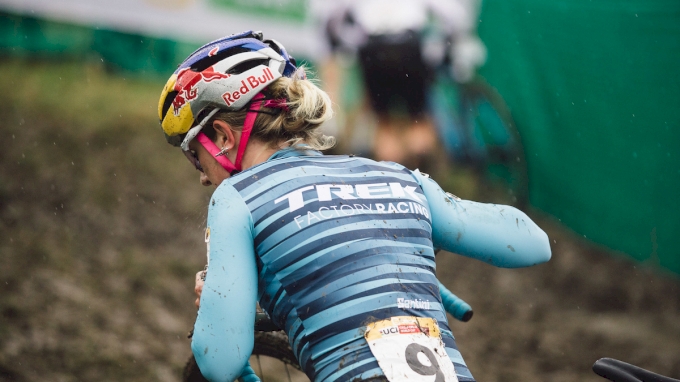
Red Bull and Trek came on as sponsors for the 2018-19 season (Balint Hamvas)
What does the future look like?
Honestly, I don’t really know—I’m hesitant to plan too heavily right now. I’m thinking about the World Championships in 2022 in Arkansas. In 2019, I’m trying everything I can to get better and have a good end to the season. But I’m also thinking long game.
In 2022, the World Championships are here and that matters to me. That’s a huge opportunity, and it’s great to be able to think about that as the long-term goal versus thinking ‘I have three weeks until Nationals and I want to win that.’
Sometimes it doesn’t matter how much you want it.
This has changed goal-setting for you, since you don’t know what your health will be doing and can’t set those concrete markers.
Exactly! This summer, I had to see so many goals get cancelled. I went to Flagstaff to train for MTB Nationals and immediately got a bad infection and couldn’t ride. All these things I was planning, all the goals I had set, I had to keep revising them and reassessing.
At a certain point, I had to realize I needed to take it one day at a time. I’m finally back to where I can feel OK in normal life, but I need to bring the high-intensity back around.
I have a skeleton schedule of what I want to do, but I don’t know exactly what it looks like. I’ll be racing though. I’m not done.
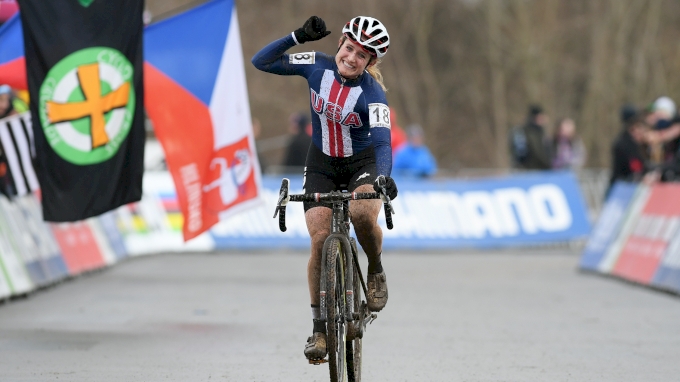
Celebrating a medal in the 2017 U23 World Championships (Getty Images)
The last thing I want to talk about is that you’ve alluded to these challenges on your social media but tried to stay positive. How has that been?
It’s been hard—I don’t want to be negative, but I also don’t want to be disingenuous and pretend everything is great. And I really don’t want to continually be saying that a race fell short of my expectations. I’ve wanted to keep it positive because that’s who I am.
I don’t want to bring people down. Behind the scenes, yes, I have frustrating moments and I’ve been upset. And I want people to know that I have hard times too—I just think it’s important to have an optimistic twist on things because it’s who I am.
I’m a firm believer that I can’t change my experiences, but I can choose the way that I share them, and maybe my experiences can help other people when I share. I’ve had people tell me it makes them feel supported and better reading what I’m going through.
At the end of the day, I’m in this and I’m living it, and I’m not planning on giving up. I didn’t waste a year of my life on this to quit now.